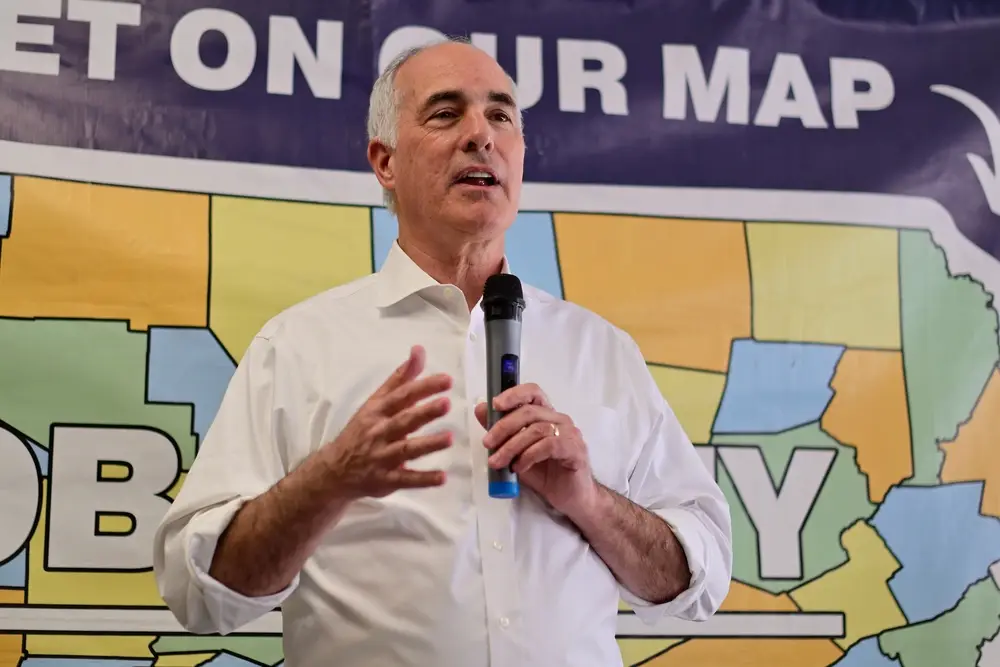Nearly a quarter century after the passage of the Americans with Disabilities Act, there was no committee in the U.S. Senate specifically tasked with focusing on disability issues or people with disabilities. So when he became chairperson of the Senate Special Committee on Aging, U.S. Sen. Bob Casey (D-Pa.) just went ahead and added disability issues to its purview.
“We kind of just decided it would be part of the work of the committee,” Casey told the Capital-Star. “And nobody stopped me.”
Robert P. Casey Jr. is leaving the U.S. Senate at a time when his brand of public service politics is becoming more and more rare. He lost his bid for reelection to a fourth term in November to Republican Dave McCormick.
There’s a distinct throughline in Casey’s political career: helping vulnerable people. That list has included not only people with disabilities, but also elderly people in nursing homes that provided substandard care; veterans who suffered health problems related to burn pit exposure while on active duty; pregnant workers facing discrimination; children in low-income families; and coal miners who didn’t want to breathe polluted air.
But it’s the Achieving a Better Life Experience (ABLE) Act, which became law ten years ago this month, that became Casey’s best-known piece of legislation. ABLE accounts allow people who became disabled before age 26 to save more than $2,000 without endangering the asset limit of the federal assistance programs — such as SSI and Social Security —that many people with disabilities rely on.
It was one piece of the ongoing work Casey did on behalf of the disability community, first as auditor general of Pennsylvania and later picking up the work of former Sen. Tom Harkin, an Iowa Democrat, in the U.S. Senate.
As he did whenever he spoke about his 18-year career in the Senate, Casey was quick to share credit with others who worked with him when speaking about the ABLE Act, pointing to his disability policy director Michael Gamel-McCormick as “a rock star in the disability community.”
Over the course of his political career, Casey’s low-key, unassuming style has been called boring — and even garnered a comparison to a bowl of oatmeal. But to mistake his calm demeanor for weakness is flatly wrong, and misrepresents how effective and determined Casey was in representing Pennsylvanians who did not always have a seat at the table where decisions are made.
When meeting with constituents, Casey did more listening than talking, a vanishing but crucial skill needed to craft effective legislation. He has been lauded for bringing people with disabilities into positions of influence as he worked on legislative solutions, where they could contribute to policy-making that would have a direct impact on their lives.
READ: After Decades in Office, Casey Couldn’t Overcome Voters’ Desire for Change
Casey told the Capital-Star that in his view, “the disability community, I think, has never been more engaged, never been more effective. And part of that was driven by the work that I and others did to advance disabilities issues, to kind of put them to the front of the agenda,” he said “But part of it was driven by by threats that were posed to the disability community by the the effort in 2017 to repeal the Affordable Care Act.”
Without the work of their “broad and deep” community, Casey said, he thinks the ACA would have been repealed. “Some of the most compelling testimony that I’ve ever read as a public official, I think, was presented by families with a child with a disability, usually moms coming to Capitol Hill, often bringing their son or their daughter who depended upon these important programs.”
He said that like any person who takes on a cause or becomes an advocate for an issue or a group of people, there were multiple points of origin for how he became interested in the work. Casey pointed to his work as auditor general, where he released a 1998 report on the state health department and its failed regulation of nursing homes that often let complaints drag on while patients suffered.
“In the Senate, just in terms of disability work, it was kind of an outgrowth of the work I had done in state government, but it was also driven by opportunity,” he said; no one was picking up the mantles of the late Sen. Ted Kennedy and the retiring Harkin, leaving a void. “The disability community literally came to me and asked for help, but if Tom Harkin were still in the Senate, those opportunities may not have been available.”
As his time in the Senate comes to a close, Casey said he’s been reflecting a lot and was trying to recall what pushed him toward working with people with disabilities. Unlike Kennedy and Harkin, he didn’t have a direct personal connection or family member with a disability. He said he recalled his father, former Pennsylvania Gov. Robert P. Casey Sr., being a staunch supporter, yet another indication of the deep impact the Casey family has had on public policy.
“When my father was auditor general,” Casey said, “I distinctly remember a black and white photograph on an Easter Seals campaign of a child with a physical disability … I think that’s the first time that I remember learning something about children with disabilities and the connection to a public official or policy.”
A more recent piece of legislation Casey shepherded through Congress was the Pregnant Workers’ Fairness Act, which took effect in 2023.
“That’s a bill that I was kind of traveling alone on the road for,” Casey said, as he had difficulty finding a Republican willing to co-sponsor the bill after original sponsor Kelly Ayotte lost her Senate seat in the 2016 election.
Sen. Bill Cassidy of Louisiana eventually stepped up to help garner support for the bill, which requires a business with 15 or more employees to make reasonable accommodations for pregnant workers — such as additional bathroom breaks, or the opportunity to sit while working.
READ: Is Pennsylvania Still a Swing State?
Neither the Pregnancy Discrimination Act nor the ADA provided the accommodations that pregnant workers needed for a healthy pregnancy, so, Casey said, they “borrowed a two-word solution from the ADA: ‘reasonable accommodations.’”
“Once we got it through the [Senate] Health Committee, it was a question of ‘how do you get it to the floor,’ so we attached it to the appropriations bill that passed in December of 2022, and that’s how it got done,” Casey said, once again giving credit to his colleague: “Bill Cassidy had to take on members of his own party because half of his caucus voted against the amendment.”
During his final Senate Aging committee hearing earlier this month — which focused on opportunities in the workforce for people with disabilities — labor advocate Ai-Jen Poo called Casey a “generational leader on these generational challenges we face as a nation. Millions of lives have been improved because of your leadership and hard work in this area of policy,” she said. “While it is daunting to face the challenges ahead without you at the helm, we are determined to carry the torch forward.”
When he bid farewell to the Senate last week, Casey quoted Martin Luther King Jr., in a statement that also describes Casey’s time in elected office:
“‘Everyone can be great because everyone can serve,’” he said, quoting King. “King taught us in that simple statement, that the word ‘great’ in this context isn’t about fame or acclaim or notoriety or riches. Great is about something much more valuable: the opportunity to help others. I will continue to do my part to serve as a citizen and as a Pennsylvanian.”
Even during a bruising Senate campaign and despite the challenges looming in the coming administration, Casey continued the quiet work that had such a vital impact on his home state and millions of Americans until his final days in the Senate.
Pennsylvania is losing a devoted fighter with deep experience in Congress. But it was fortunate to be represented by someone with Casey’s unrelenting compassion for people who simply needed help from their government.
Pennsylvania Capital-Star is part of States Newsroom, a network of news bureaus supported by grants and a coalition of donors as a 501c(3) public charity. Follow Pennsylvania Capital-Star on Facebook and Twitter.







